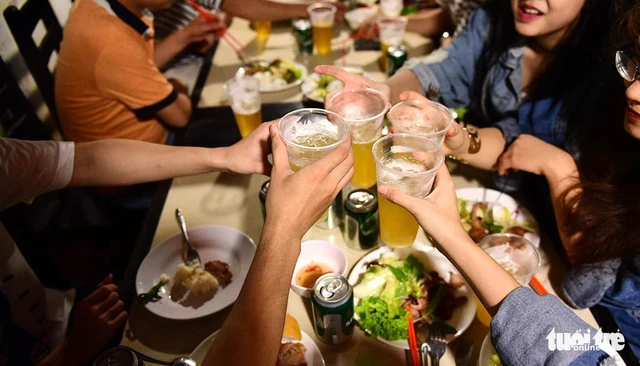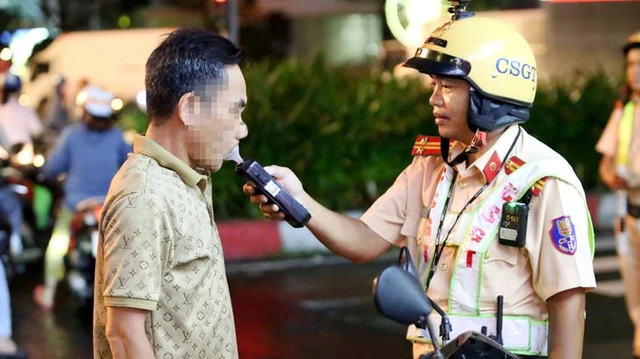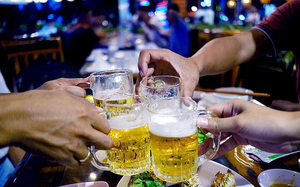
Is after-work drinking culture dying in Vietnam?
Teachers’ Day 2013 was my introduction to after-work drinks in Vietnam. Students and colleagues from a few of my jobs all insisted I go out for drinks to bond and celebrate.

Young people drink beer at a party in Ho Chi Minh City. Photo: Quang Dinh / Tuoi Tre
What I was to learn in the following months was that this was not a rare occasion but a solid part of Vietnamese culture that happened weekly.
From farmers to factory workers and office employees at global companies in big cities, all steadfastly held on to this practice.
But the reality was that Vietnam was holding onto a practice that had been dying off in most Western countries for decades.
As a comparison, Australia saw steep declines in the 'long lunch' (a business tradition of going out to lunch and then spending the entire afternoon drinking and eating) in the late 1980s. Even 40 years ago, the concept of 'beer as the social glue' was losing its appeal.
There were a number of other factors that contributed to this cultural change: government-imposed changes to taxation laws, changes to driving laws, and an economic recession that drove unemployment.
Collectively, these factors shattered the idea of gathering to drink and moved people toward working harder, longer, and smarter.
After not having this drinking-at-work culture for many years, it is not missed. The result was that nothing changed in relationships, productivity, or workplace dynamics.
The conclusion was that this assumed positive habit of drinking with your workmates was not positive at all. In fact, it appeared to have little or no effect on the overall operation of a business.
And this is where Vietnam stands at the moment.
Changes to drink-driving laws in recent times, continued globalization—which also means different working hours—and a more focused workforce experiencing significant wage growth are all factors driving the reduction in after-work gatherings and drinking activities.

A Ho Chi Minh City traffic police officer checks a driver's blood alcohol level. Photo: Minh Hoa / Tuoi Tre
Beyond the cultural aspects, we also have a smarter society. Access to up-to-date information on the effects of alcohol has placed young people in a better position than ever before in the country’s history.
They are learning, in detail, the long-term effects of alcohol overuse.
Globally, alcohol consumption dropped from 5.62 liters per person in 2017 to around 4.89 liters per person in 2020. This trend has continued post-COVID, with more and more people consuming less alcohol.
Conversely, non-alcoholic beers have seen unprecedented levels of sales across the world, with predictions for 2025 put global sales at a potential $38 billion or more.
This is supported by reports from brewers that non-alcoholic beers have shown the biggest increases in sales in many Western markets.
It needs to be clear that talking about this global culture change does not imply 100 percent compliance with new practices.
Go to any bar in any major global city on a weeknight, and you will see office workers out having fun and enjoying alcohol.
But this is done in a very different way in today’s world and is often more friend-based than a purposeful gathering of colleagues.
That said, you’ll find that this group is more likely to be younger, as more senior members choose not to risk their health, job performance, or reputations by going out drinking with younger colleagues during the week.
It should also be noted that drinking culture varies greatly from country to country and people do things differently depending on where they are.
Furthermore, statistics on alcohol consumption have noted a marked decline among 18- to 34-year-olds. This further supports the notion of a move away from 'staff drinks' after work, as younger people are drinking less, and less often.
What this points to is that Vietnam is catching up to developed nations.
Global operations are seeing Vietnamese office workers working different hours and prioritizing their careers, responsibilities, and families over drinking with colleagues after work.
And while there are no statistics yet on the results of this decline, Vietnam should follow global trends and see a reduction in alcohol consumption with little to no change in operational performance or workplace relations.
There is one final point that is often unspoken.
The consumption of alcohol, even in small amounts, can greatly impact young men and women suffering from a range of mental health issues.
Unfortunately, mental health issues are at an all-time high, with WHO estimating that around 14 percent of the population in Vietnam suffers from some form of mental illness.
Alcohol consumption only worsens the condition for those affected, and being socially coerced into drinking with colleagues is a dangerous recipe for disaster for young men and women with severe mental illnesses.
This was the very situation I found myself in at a global company in Ho Chi Minh City.
As a result, my only way out was to avoid after-work gatherings and tell colleagues I was on medication for a made-up illness that prevented me from consuming alcohol.
It caused me much stress at a time when my illness was at its worst.
All of this change is good.
The world is changing, and rather than being left behind, Vietnam is moving ahead in leaps and bounds because young people are more informed and more focused on a better lifestyle.
Parties still happen and people still drink, but it has become the exception rather than a weekly norm as was once the case.
I am very happy to see this culture subside and slowly die off in Vietnam.
There are much better ways in modern society to bond and create good working relationships.
Pickleball, running, e-sports, and clubs are just some of the ways young Vietnamese adults are doing it better—creating a new, healthier, and stronger culture for future generations to follow and enjoy.
Ray Kuschert / Tuoi Tre News Contributor
Link nội dung: https://news.tuoitre.vn/is-after-work-drinking-culture-dying-in-vietnam-103251105224558459.htm

